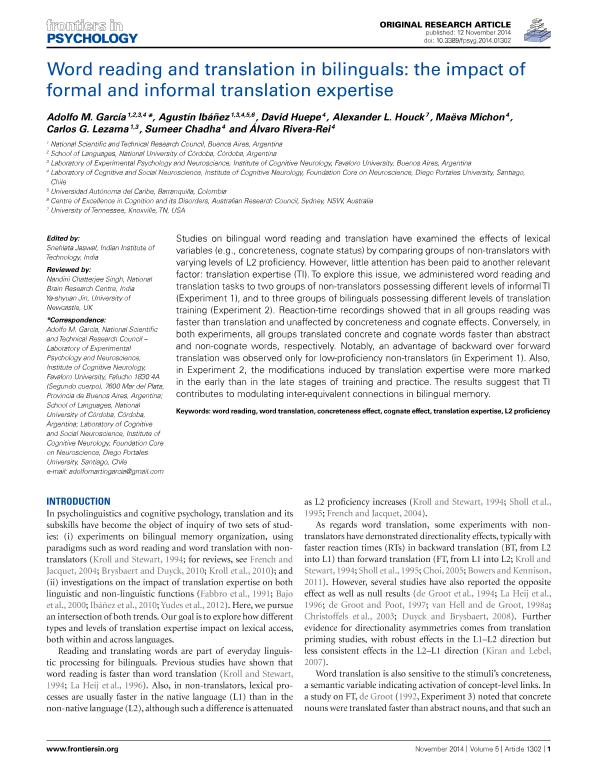Artículo
Word reading and translation in bilinguals: the impact of formal and informal translation expertise
García, Adolfo Martín ; Ibañez, Agustin Mariano
; Ibañez, Agustin Mariano ; Huepe, David; Houck, Alexander L.; Michon, Maeva; Gelormini Lezama, Carlos
; Huepe, David; Houck, Alexander L.; Michon, Maeva; Gelormini Lezama, Carlos ; Chadha, Sumeer; Rivera Rei, Álvaro
; Chadha, Sumeer; Rivera Rei, Álvaro
 ; Ibañez, Agustin Mariano
; Ibañez, Agustin Mariano ; Huepe, David; Houck, Alexander L.; Michon, Maeva; Gelormini Lezama, Carlos
; Huepe, David; Houck, Alexander L.; Michon, Maeva; Gelormini Lezama, Carlos ; Chadha, Sumeer; Rivera Rei, Álvaro
; Chadha, Sumeer; Rivera Rei, Álvaro
Fecha de publicación:
11/2014
Editorial:
Frontiers in Bioscience
Revista:
Frontiers in Psychology
e-ISSN:
1664-1078
Idioma:
Inglés
Tipo de recurso:
Artículo publicado
Clasificación temática:
Resumen
Studies on bilingual word reading and translation have examined the effects of lexical variables (e.g., concreteness, cognate status) by comparing groups of non-translators with varying levels of L2 proficiency. However, little attention has been paid to another relevant factor: translation expertise (TI). To explore this issue, we administered word reading and translation tasks to two groups of non-translators possessing different levels of informal TI (Experiment 1), and to three groups of bilinguals possessing different levels of translation training (Experiment 2). Reaction-time recordings showed that in all groups reading was faster than translation and unaffected by concreteness and cognate effects. Conversely, in both experiments, all groups translated concrete and cognate words faster than abstract and non-cognate words, respectively. Notably, an advantage of backward over forward translation was observed only for low-proficiency non-translators (in Experiment 1). Also, in Experiment 2, the modifications induced by translation expertise were more marked in the early than in the late stages of training and practice. The results suggest that TI contributes to modulating inter-equivalent connections in bilingual memory.
Palabras clave:
Wordreading
,
Wordtranslation
,
Concretenesseeffect
,
Cognateeffect
Archivos asociados
Licencia
Identificadores
Colecciones
Articulos(SEDE CENTRAL)
Articulos de SEDE CENTRAL
Articulos de SEDE CENTRAL
Citación
García, Adolfo Martín; Ibáñez Barassi, Agustín Mariano; Huepe, David; Houck, Alexander L.; Michon, Maeva; et al.; Word reading and translation in bilinguals: the impact of formal and informal translation expertise; Frontiers in Bioscience; Frontiers in Psychology; 5; 11-2014; 1-14; 1302
Compartir
Altmétricas



